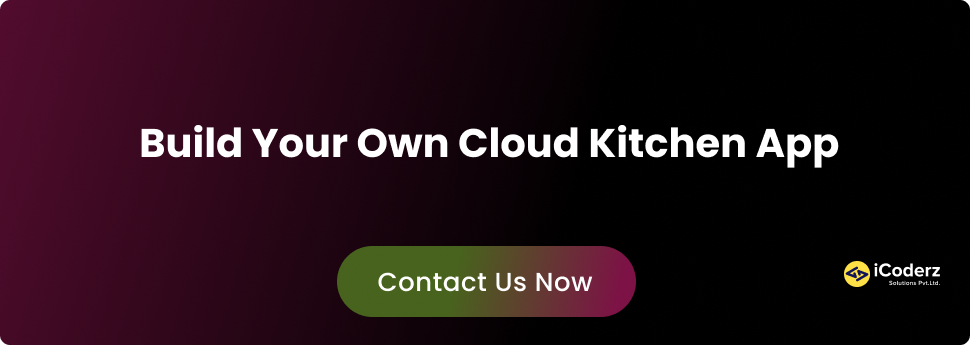Table of Contents
Cloud kitchens have become the game-changer for ambitious restaurateurs in a world where convenience and technology are paramount. The days of high startup expenses, lengthy leases, and mountains of paperwork are long gone; the best cloud kitchen benefit is you can launch your culinary empire from the comfort of your home. Zomato cloud kitchen brand is one of the top in India.
However, precisely how does one go off on this fascinating journey? Do not be alarmed; we will reveal all the details of How to Start a Cloud Kitchen in today’s blog post. We have covered every step, from creating scrumptious meals that tempt taste buds to utilizing cutting-edge delivery technologies that quickly satisfy hungry clients including cloud kitchen startup costs. Get ready to cook up success like never before by donning your apron and preparing to cook. You can get your cloud kitchen solutions here!
By FY26, it is anticipated that the Indian cloud kitchen market will develop at a compound annual growth rate (CAGR) of 24% and reach USD 1.9 billion. In FY22, it was projected to be worth USD 800 million, per research by the consulting company Wazir Advisors.
What is Cloud Kitchen?
A “ghost kitchen” or “cloud kitchen” is so named because it is not physically visible to the general public. Cloud kitchens lack all the setup, unlike eateries that allow dine-in. In contrast to the opulent design used in restaurants, cloud kitchens require the least room and culinary equipment.
How To Open A Cloud Kitchen In India?
This article will review the costs, license needed, location options, and everything else you need on how to start a cloud kitchen business.
1. Place & Property
Before beginning a cloud kitchen, the crucial cloud kitchen requirement is location and property. High traffic and a premium real estate location are not requirements for a cloud kitchen. As there is no House Front, it may be readily set up in a 250–300 square foot room. This significantly lowers the cost of starting a cloud kitchen.
The cloud kitchen may be in a remote location, but there is often a high client demand, especially for a particular kitchen. Wondering how to start a cloud kitchen from home? The answer is here. An ideal place for a cloud kitchen is a residential area where you can cook and deliver food from your home, the back of a market, or an empty parking lot.
2. Licenses
The appropriate licenses and certifications must be obtained to start a cloud kitchen. Second, getting the proper permissions will shield you from legal issues. Second, customers are satisfied with the establishment’s licensing because they cannot inspect it for cleanliness, food safety, or preparation. To persuade your clients that your cuisine is of the highest caliber, you might advertise these on your website and in your marketing activities.
FSSAI(Food Safety and Standards Authority of India ): Obtaining an FSSAI license is required for any business dealing with food, and the firm and its owner are responsible for doing so. The license period, which can be from one to five years, must be renewed before it runs out. Putting FSSAI on the package and invoice is also helpful to increase our client’s trust in our offerings.
GST: GST registration is required for all businesses operating in India, and it’s also advisable to file all company-related taxes on time. GST must be filed weekly, every three months, and every year. GST also aids in finding authorized sellers because it lowers taxes when everyone has a GST number. We will apply for a GST number once we have a bank account.
Every company must have a trade license, and the cloud kitchen is no exception. This can be obtained by presenting the required documentation to the neighborhood municipal office. In addition to the fee, we need a little extra cash to accomplish the job. It is a one-time task and requires legal action.
Before starting a full-fledged Cloud Kitchen, obtaining a Gumasta dhara, shop, and establishment license is crucial. In India, whether it is a food truck or a fine dining restaurant, all cloud kitchen business models must comply with the Shop and Establishment Act. All restaurants are required by law to keep the records required by the Shops and Establishments Act, such as approval from the labor department, attendance records, and salary registers with information on employees’ wages, fines, advances, deductions, and holidays.
ALSO READ: The Anatomy of a Great Cloud Kitchen App Model in UAE & USA
3. Registration for Udyam
Register your Cloud kitchen as Udyam, please. The signup process is really easy and offers you a lot of advantages. Thus, Udyam is required to register your cloud kitchen.
Although it is not initially required, obtaining a fire and safety license is a wonderful way to prevent problems in the future. Fire and human health agreements are needed in every business and are part of the law.
Due to the significance of the company’s brand name, trademark registration is also crucial for the cloud kitchen business. Companies must file trademark applications for their logo, title, and wordmark that incorporate various colors and patterns to build their distinctive identity on the market and protect their brand.
4. Putting Online Food Ordering Into Practise
After choosing the venue, you must choose the technology to take orders. Numerous websites accept online orders on your behalf and deliver meals to your consumers, like Swiggy, Zomato, Foodpanda, and others. These businesses typically demand 18 to 30% of your sales for each order. There may also be a one-time integration cost for certain FoodTech businesses.

A website with an option to order food online is a requirement because a cloud restaurant only relies on its internet presence to attract clients. A well-optimized website can be created for you by various website developers. You can, however, also use the services offered by Posist, which are also integrated with your POS software, increasing your efficiency in handling clients and accepting orders even more. Additionally, customers get real-time access to order tracking.
5. Kitchen Utensils
Depending on the cuisine you serve, the cooking equipment will vary. A stove and oven, refrigerator, knives, and other essential appliances are needed to establish a cloud kitchen. Here is a comprehensive list of kitchen supplies required for an Online Food Delivery App Development.
6. Packaging
A food company’s packaging is an essential component of operations. No matter how delicious the cuisine is, it will ultimately ruin the customer experience and damage the company’s reputation. The type of food also affects the packaging. Plastic bottles, utensils, and other items are required for effective food packaging.
7. Staff
Staff Because there is no House Front, your cloud kitchen doesn’t require a large team. You can start a shop with just 2-3 workers working solely on food preparation and distribution. When you have several kitchen brands, the same chef will make cuisine for numerous brands.
Salary Accounts, PF, etc.: Regrettably, most cloud kitchen owners neglect to take care of these matters because blue-collar workers don’t give a damn about paying taxes or receiving Provident Fund. When you have a long-term goal and are engaged in serious business, beginning the cycle from day one is crucial. It benefits the team by fostering a climate of friendship and mutual trust in the long term.
8. Point of Sale Using Technology To Create A Cloud Kitchen
Accurately accepting food orders is crucial to the online meal ordering and delivery system. Keeping tabs on the volume of orders from the various online ordering channels is also vital. Restaurant operations depend heavily on order tracking and thorough reporting.
Choose a point-of-sale system that has been tailored to meet the needs of the Online Food Ordering Platform. The one we advise is our very own Posist program, which is entirely browser-based and hardware-independent. To create the bills, you can use any web-enabled device, such as a computer, laptop, tablet, or mobile phone.
9. Creating and Marketing Online Orders
Once the kitchen and personnel are in place, create online orders for your cloud kitchen business.
Spending on promoting the meal delivery brand is crucial, at least early, because a cloud kitchen lacks a dine-in facility and relies entirely on phone and online food orders. Online marketing is essential in this scenario because there isn’t a shop with display boards and signage.
- Making Your Cloud Kitchen Available to Online Food Aggregators
- Your Cloud Kitchen’s Promotion on Online Aggregators
- Use of social media
- Optimization for search engines
- SMS, email, and loyalty programs
ALSO READ: Online Food Delivery Business Model: A Comprehensive Guide
Understanding the Benefits of Cloud Kitchen
1. Cost-Efficiency:
One of the most significant advantages of cloud kitchens is their cost-effectiveness. By eliminating the need for a physical storefront in prime locations, businesses can save on hefty expenses associated with rent, utilities, and interior decor. This cost-saving measure allows for more competitive pricing of menu items, making it an attractive option for both entrepreneurs and consumers alike.
2. Flexibility and Scalability:
Cloud kitchens offer unparalleled flexibility and scalability. With minimal infrastructure requirements, businesses can swiftly adapt to changing marketplace demands and scale their operations without the constraints of brick-and-mortar establishments. Whether it’s expanding into new locations or experimenting with different cuisines, cloud kitchens provide the agility needed to thrive in a dynamic industry.
3. Streamlined Operations:
Operating in a virtual environment streamlines various aspects of the business, from order processing to inventory management. With the integration of technology and data analytics, cloud kitchens can optimize workflows, minimize wastage, and enhance overall efficiency. Automated systems for order routing and fulfilment further streamline operations, ensuring prompt and accurate deliveries to customers.
4. Enhanced Customer Reach:
Unlike traditional restaurants, which are limited by their physical footprint, cloud kitchens can cater to a broader customer base. Leveraging online platforms and food delivery services, businesses can reach customers beyond their immediate vicinity, tapping into new markets and demographics. This expanded reach opens up lucrative opportunities for growth and brand exposure.
5. Seamless Integration with Delivery Platforms:
The proliferation of food delivery platforms has transformed the way people order food. Cloud kitchens are tailor-made for this digital era, seamlessly integrating with popular delivery apps and online ordering systems. This accessibility ensures that customers can easily discover and order from their favourite cloud kitchen brands, driving sales and visibility.
6. Data-Driven Insights:
In the digital age, data reigns supreme. Cloud kitchens leverage technology to gather valuable insights into customer preferences, order patterns, and market trends. By analyzing this data, businesses can make informed decisions regarding menu development, pricing strategies, and marketing campaigns. This data-driven approach not only improves operational efficiency but also allows companies to stay ahead of the competition.
Conclusion
Starting a cloud kitchen is no easy task, but it is possible with the correct planning and strategy. We have identified some crucial actions to take when launching a cloud kitchen so you may succeed in this expanding sector. Many variables go into creating a successful cloud kitchen business, from menu item strategy to comprehending regulations and setting up an effective delivery method.
We wish you luck as you set out on your quest to manage a prosperous cloud kitchen with these suggestions in mind. You can also contact us for cloud kitchen app development!
Frequently Asked Questions ( FAQ’s )
What are Among the Cloud Kitchens’ Most Notable Advantages?
The fact that you do not need to own a business or space of your own and are not required to pay for prime administration costs, such as rent, power, and other expenses, are significant benefits.
Is Operating a Cloud Kitchen from Home Legal?
Yes, starting a cloud kitchen from your house is entirely legal. To start a home-based Cloud cooking Business in India, you will need key permits like an FSSAI license and a Fire NOC from the fire department for the cooking facility.
Is the Cloud Kitchen Company Making Money?
The cloud kitchen business model is highly profitable because it can be scaled more quickly than restaurants with dine-in alternatives. This business model’s profit margin typically falls between 20% and 25%. The volume of orders the cloud kitchen gets and completes ultimately determines the revenues.
What considerations Ought to be Made When Developing Menus?
Factors like competitor analysis, the goal of your service, and client research must be considered to construct a top-notch menu.





